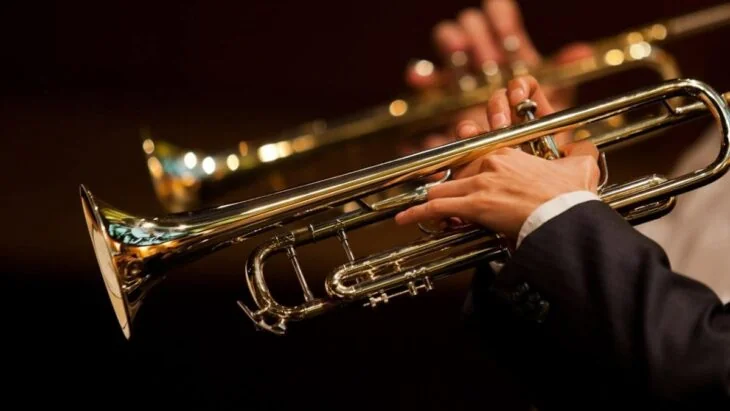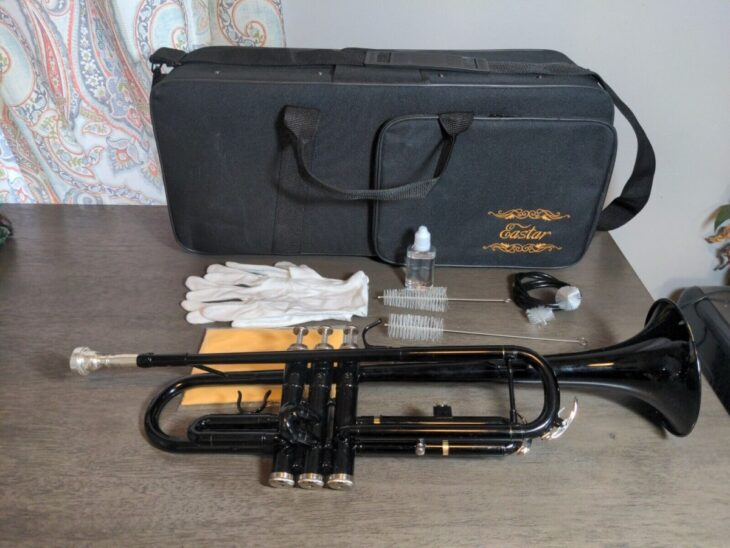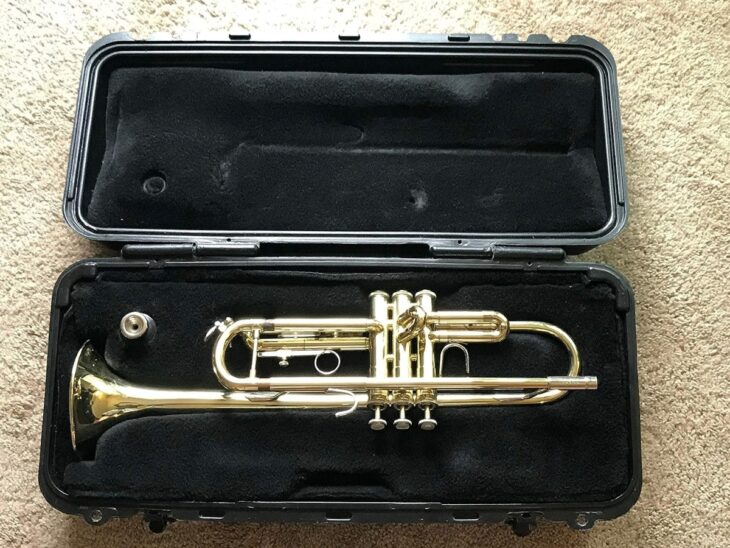The trumpet is one of the best-known instruments out there. Instantly recognizable, both by sight and sound, a stalwart of the brass family and a true classic of every ensemble.
If you’re in the market for a trumpet, whether it’s your first, or you’re after an upgrade, it can be hard to know what to look for. How much should you be paying?
In this price guide, I’ll break down the different kinds of trumpets on the market to make it easier for you to know what you’re looking for, how much you can expect to pay, and which kind of trumpet is right for your needs.
Generally speaking, taking all factors and categories of trumpet and trumpet player into consideration, the broad spectrum of prices for a trumpet ranges from around $300 – $10,000!
So let’s take a look at what determines those prices.
Table of Contents
What Influences the Price of a Trumpet?

When it comes to trumpets, or indeed, musical instruments in general, it’s essential to acknowledge the factors that will determine the cost of said instrument.
The biggest determining factor will be quality. What kind of materials were used to construct the trumpet, and how it was assembled, can play a huge role in the cost of the finished product.
Usually, the cheaper an instrument, the lower the quality of the materials used to build it. This is not to say that any cheap trumpet is a hunk of junk – you can get cheap instruments that are not made with high-end metals but are perfectly fit for purpose.
Other things will influence the cost of a trumpet, too. The make and model, the size, the type of trumpet, and, if you’re buying second-hand, the age and condition of the instrument. The type of trumpet you buy, and whether you opt for pre-owned or brand new, will largely depend on what kind of player you are.
This brings us to the most essential thing to consider: the level of instrument you’re buying. Of course, the market will cater to all kinds of players, you just need to figure out which category you fit into. It’s easy to break the trumpet-playing (and -buying!) crowd into three chunks: beginners, intermediates, and professionals.
But before we get into that, let’s take a closer look at those cost-influencing factors.
Materials and Quality

Trumpets are brass instruments traditionally, and 90% of the trumpets on the market will be constructed of brass.
At the lower end of the price scale, you’ll find the only trumpets not made of brass. Many beginner and child trumpets are constructed from plastic.
Most beginner-to-intermediate trumpets are made from brass and finished either with a lacquer or nickel plating.
Then, at the professional end of things, trumpets are of course made from brass, but may be finished with plating in either silver or gold.
Type and Tuning

Most trumpets, especially those that are provided to students and beginners, will be in the tuning of Bb. This is because most band music is written for trumpets in that tuning, and Bb trumpets are more widely-used and therefore slightly cheaper.
The next most common tuning is a C trumpet, which will be slightly more expensive than a Bb.
There are also trumpets tuned to D/Eb and F/G, which again will cost more, due to their rarity.
Brand Name
As with all things, there are certain companies that are known for manufacturing high-quality products for certain industries. Well, trumpets are no different.
When you buy a trumpet from a well-known and respected brand like Yamaha, Bach, or Getzen, you know you’re going to get a quality instrument, along with expert advice and care after your purchase. This will undoubtedly increase the cost of the trumpet, no matter the type of instrument you’re buying.
Conversely, if you choose to buy a trumpet from an unheard-of brand on Amazon, like this beginner set from Eastar, you’ve got less guarantee that you’re getting a quality instrument. That’s not to say you can’t find a more than adequate trumpet for a bargain price – it’s just less likely. Remember: you get what you pay for!

Trumpet Price Guide
Now let’s take a look at those rough categories we outlined earlier: beginner, intermediate, and professional. What makes a certain trumpet fall under one of those headings, and more importantly, how much is it likely to cost?
Absolute Beginner Trumpets – $300 or less
Beginner trumpets are exactly what they sound like – trumpets designed and built specifically for those just starting out on their journey to learn and master the most popular brass instrument.
But obviously, not everyone who starts to learn the trumpet will continue playing it. So these instruments in particular are made for those who know that this might not be a life-long investment.
This is why the low end of the low end of the spectrum is the only place you’ll find trumpets made of plastic! Granted, these usually are for absolute beginners, usually still children, who are showing an inkling of interest toward music.
Despite the prejudices a pro might have about plastic trumpets like this one from pInstruments, they are the ideal choice for beginners for their price.

Aside from the plastic ones, beginner trumpets are likely to be made with lower quality brass, and finished with a standard lacquer. They’ll be less resistant to bumps and scrapes, and their sound quality won’t be as crisp and clear as anything even a few hundred dollars more expensive.
However, if you’re willing to shell out a tiny bit more, you can get a basic brass beginner kit like this one, which is perfect for taking the leap from plastic to brass.
Student Beginner Trumpets – $300 – $1,000
If you (or your students) are beginning to look at trumpet playing more seriously, then it might be time to invest in something a little more reliable.
The next step up in beginner trumpets is to look at reliable student models from reputable brands, like this Prelude trumpet, or this one from Bach, which is slightly more expensive.

The brass used in the construction of these instruments will be of better quality, and the mouthpiece and fittings will be more durable too.
The finish will probably still just be lacquer, but the trumpet itself will be of overall higher quality, and slightly larger to be more suited to your growing dexterity
Intermediate Trumpets – $1,000 – $2,500
As the trumpet player progresses and their ears become more attuned to pitch, tone, and subtle nuances when producing different notes, they will begin to favor instruments of higher quality.
Intermediate trumpets span a wide range in the middle of the price spectrum, but for the vast majority of regular-but-not-professional musicians, they will form the main part of their instrument catalog.
That’s why you can find big names like Yamaha in this price bracket.
These instruments are definitely a good leap up in terms of price, but also in terms of quality. Manufacturers know this price range is where most musicians will stay for most of their careers, so these instruments are built to last, sound great, and be easy enough, but still satisfying, for the discerning intermediate to play.
Interestingly, you can find trumpets in this price bracket marketed as ‘student’ (at the low end), and ‘professional’ (at the high end), which should say a lot about how much instruments can vary between manufacturers.

Professional Trumpets – $2,500 and Above
Professional trumpet players will demand the very best in terms of build quality, material quality, and extra features, such as rose, yellow, and gold brass seamless bells, which improves resonance, intonation, and projection.
The professional trumpet is built with no thought for cost-cutting, but purely for the quality of sound produced, the longevity of the instrument, and the playability for the musician.
Unless you’re playing trumpet for a living, it’s totally unnecessary to even consider a trumpet of this caliber. They’re beautiful instruments crafted to the highest of specs, but their cost is prohibitive for anyone other than a pro. Take a look at this Bach trumpet for an idea of what you can expect from a professional trumpet.

Final Thoughts
As you can see, there are trumpets all the way up and down the cost spectrum, varied enough to suit the needs of any player. If you’re an absolute beginner, it’s best to look at the higher end of the lower price bracket and avoid non-brass models.
Although these will be much cheaper, if you know you want to at least have a go at learning the trumpet, it’s better to get acquainted with brass straight away!

